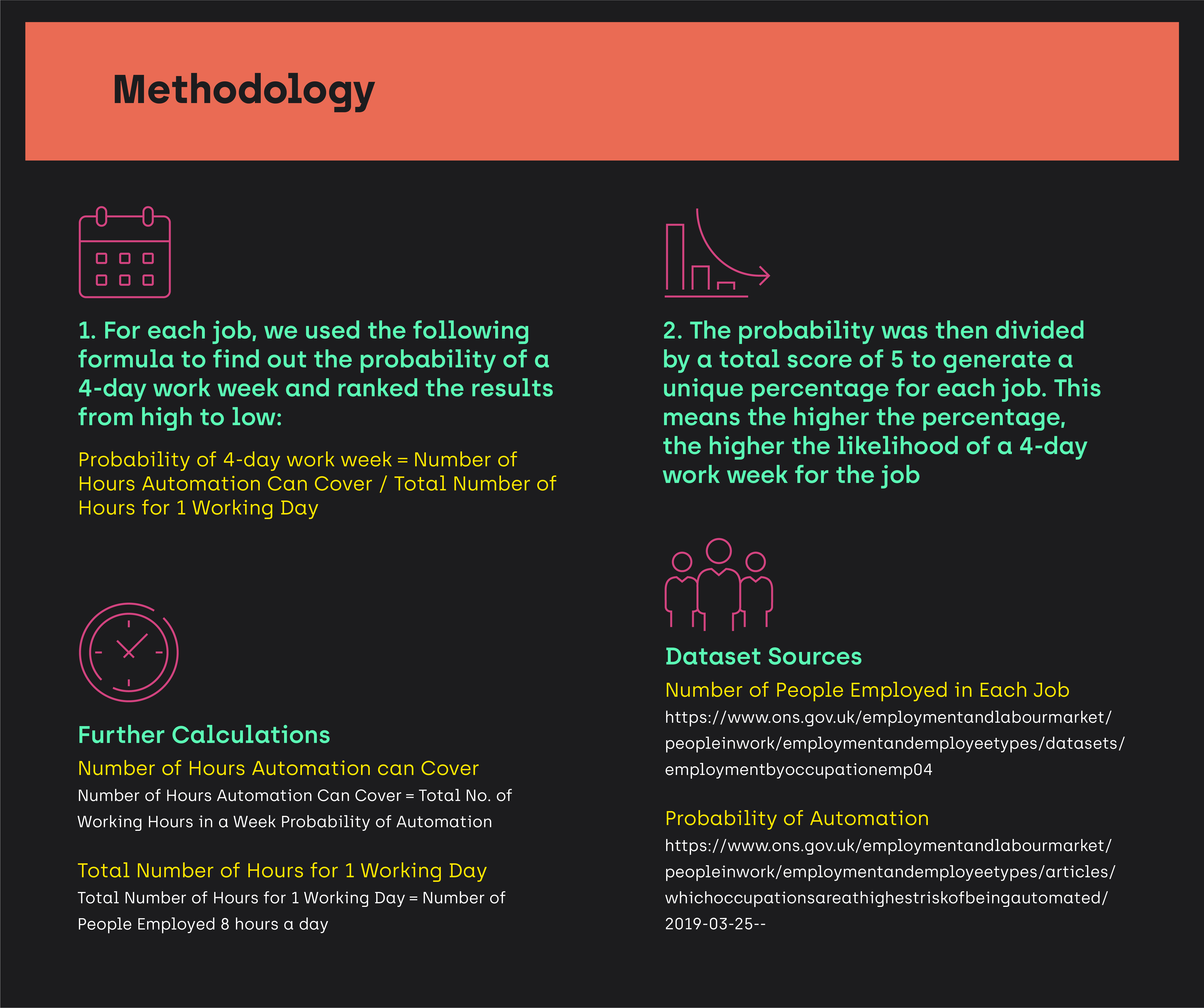For the past 40 years, the number of hours UK employees work each week has remained largely static. Despite serious advances in technology over this time, full-time employees continue to clock up between 36 and 40 hours a week.
In fact, the UK has some of the longest average working hours in Europe. But rather than making us more productive, this is simply creating a more overworked and stressed workforce.
Change could now be at hand, even if it may have taken a global health crisis to catalyse it. The shift to remote work by necessity highlighted to employers that, driven by technology, new working styles can deliver new benefits. Business leaders now have a window of opportunity to rethink the status quo and rebuild working life in a way that benefits both individual wellbeing and business productivity.
The four-day week is one such proposal, and it’s a significant one. It’s believed by some that automation technologies could offer the solution to make the hefty reduction in mandatory hours possible, enabling workers to adjust their focus from repetitive, manual tasks to those requiring creativity, communication, leadership and problem-solving (or soft skills).
The prospect of gaining an extra day a week of personal time will have many employees rubbing their hands (or breathing a sigh of relief) in anticipation. But no two jobs are the same, and the requirements of certain roles may be better placed to make the transition in the near-term than others.
With this in mind, illumo digital set out to identify which jobs are most ready for the four-day working week. Read on for the findings and explore the results in our interactive infographic.
Firstly, what is the four-day week?
According to the ‘4 Day Week’ – a voluntary group campaigning for the change in working hours – a four-day week is defined as a 32 hour working week (or less) worked over four days with no loss of pay for workers that have moved from a five-day working week.
What are the benefits of a four-day week?
Firstly, the concept of a four-day working week without loss of pay is not new. Pilot initiatives have been run by governments and businesses in countries around the world, including New Zealand, Iceland, Spain and Japan. A number of forward-thinking companies have also embraced extended trials, including Kickstarter and Wanderlust.
Reports from studies seem to demonstrate success, with four-day week workers reporting that productivity increases anywhere from 20% to 40%. Workers also reported:
- a better work/life balance
- more quality time with loved ones
- a reduced requirement to take sick days
- lower childcare costs
- higher morale.
Other purported benefits include:
- better mental and physical health
- reduced gender inequality
- stronger communities
- reduced unemployment and underemployment levels
- increased domestic tourism
- higher civic and political participation.
There is also an environmental argument to be made for a reduction in working hours. A report commissioned by the 4 Day Week campaign found that moving to a four-day working week could reduce the UK’s carbon footprint by 127 million tonnes per annum by 2025. Working less could also result in more sustainable lifestyles as people would have more time to make eco-friendly choices. They might have more time to walk or cycle rather than drive, for example.
Automation opening the door to a four-day working week
In the past, sceptics have quite rightly wondered how businesses could pull off a shorter working week without negatively affecting output. However, these days the answer is simple: automation. The use of automation technology to speed up processes is likely to play a significant role in maintaining good output levels as working life changes. In fact, advances in technology make it more feasible than ever before for workers to shave hours off their work schedule without hurting their productivity.
By adopting automation solutions that can handle repetitive and rote tasks, such as appointment scheduling, email handling, payroll, shipping and inventory management and much more, businesses could turn the dream of a four-day week into a reality.
Jobs roles most likely to drop down to a four-day week
Administrative and secretarial jobs
According to our research, administrative and secretarial jobs are most likely to be able to shift to a four-day week in the future. The top eight most likely to drop down to four days are all in this category. They are:
- Receptionists
- Legal secretaries
- Sales administrators
- Bank and post office clerks
- Company secretaries
- Typists
- Bookkeepers, payroll managers and wage clerks
- Records clerks
With solutions available to automate tasks such as call handling, appointment scheduling and invoicing, the potential for these workers to work four days rather than five without hindering output is very real.
Sales and customer service
The remaining two jobs in the top ten fall under the sales and customer service umbrella. They are:
- Customer service
- Call and contact centre workers
Businesses can accommodate the move to a shorter working week for these workers by investing in technologies that can reduce the need for workers to get involved with routine customer enquiries, such as live chat services, email automation and help desk software.
Caring, leisure and other services
The only occupation on our list that falls under caring or leisure is:
- Dental nurses
Perhaps surprisingly, dental nurses could reap the benefits of a reduced working week as automation and artificial intelligence developments are made in the healthcare industry. For example, in 2020, the first robot-assisted dental surgery system was cleared by the Food and Drug Administration (FDA) in the US. Known as Yomi, the system provides software to plan dental implant procedures and also assists dental surgeons by delivering navigational guidance. Recent technological advancements in dentistry have been found to not only save time, but also result in better clinical outcomes for patients.
Further administrative roles
Next on the list, we have more administrative roles:
- Library clerks
- Officers of non-governmental organisations
- Local government administrators
- National government administrators
- Office supervisors
- Finance officers
Already we are seeing elements of these roles benefiting from automation. From self-service book borrowing stations at libraries to software that automates and streamlines everyday financial processes, technology to enable a shorter working week is developing all the time.
Associate professional and technical occupations
It’s not just lower level workers that can look forward to a future that allows for a better work/life balance. The following associate professional and technical workers are also likely like to feel the benefit of automation in the future:
- Pharmaceutical technicians
- Business sales
- Marketing
- HR & relations
- IT technicians
- Legal assistants
Many of these roles require expert insight, knowledge and skill so there should be no fear of any of these roles becoming obsolete. Instead, if businesses can be convinced of the benefits of digital adoption, workers in these roles will be able to spend more time applying their expertise on high-value tasks and less time on repetitive, routine or low-value tasks. They will also be able to enjoy a three-day weekend as standard.
Professional occupations
The following professional occupations could also be set to enjoy a shorter work week if businesses have the vision required to shake up ‘business as usual’ and create smarter working practices:
- Web development and design professionals
- Mechanical engineers
- IT architects and designers
- IT & telecommunications professionals
- PR professionals
- Quantity surveyors
- Consultants and business analysts
- Quality assurance and regulatory professionals
- Construction managers
- Journalists and editors
- IT managers
- Legal professionals
Businesses and workers are waking up to the fact that it shouldn’t be a case of choosing between people and machines. Instead, adopting automation solutions can benefit not only your business but the people who work for you by allowing them to focus on tasks that require more human input and expertise, and giving them the opportunity to reduce their working hours.
Is automation the key to unlocking a brighter future for businesses and their workers? Have your say. Join the conversation on social media using the hashtag #OneLessWorkDay.


